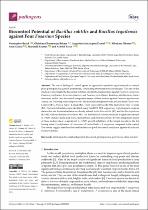| dc.contributor.author | Baard, V | |
| dc.date.accessioned | 2023-03-28T12:44:56Z | |
| dc.date.available | 2023-03-28T12:44:56Z | |
| dc.date.issued | 2023 | |
| dc.identifier.citation | Baard, V., Bakare, O.O., Daniel, A.I., Nkomo, M., Gokul, A., Keyster, M. and Klein, A., 2023. Biocontrol Potential of Bacillus subtilis and Bacillus tequilensis against Four Fusarium Species. Pathogens, 12(2), p.254. | en_US |
| dc.identifier.issn | 2076-0817 | |
| dc.identifier.uri | http://hdl.handle.net/10566/8686 | |
| dc.description.abstract | The use of biological control agents as opposed to synthetic agrochemicals to control
plant pathogens has gained momentum, considering their numerous advantages. The aim of this
study is to investigate the biocontrol potential of plant bacterial isolates against Fusarium oxysporum,
Fusarium proliferatum, Fusarium culmorum, and Fusarium verticillioides. Isolation, identification, charac-
terization, and in vitro biocontrol antagonistic assays of these isolates against Fusarium species were
carried out following standard protocols. The bacterial endophytes were isolated from Glycine max.
L leaves (B1), Brassica napus. L seeds (B2), Vigna unguiculata seeds (B3), and Glycine max. L seeds
(B4). The bacterial isolates were identified using 16S rRNA PCR sequencing. A phylogenetic analysis
shows that the bacterial isolates are closely related to Bacillus subtilis (B1) and Bacillus tequilensis
(B2–B4), with an identity score above 98%. All the bacterial isolates produced a significant amount
(p < 0.05 ) of indole acetic acid (IAA), siderophores, and protease activity. | en_US |
| dc.language.iso | en | en_US |
| dc.publisher | Pathogens | en_US |
| dc.subject | antifungal | en_US |
| dc.subject | bacterial endophytes | en_US |
| dc.subject | biocontrol | en_US |
| dc.subject | phylogenetics | en_US |
| dc.subject | polymerase chain reaction | en_US |
| dc.title | Biocontrol potential of bacillus subtilis and bacillus tequilensis against four fusarium species | en_US |
| dc.type | Article | en_US |

